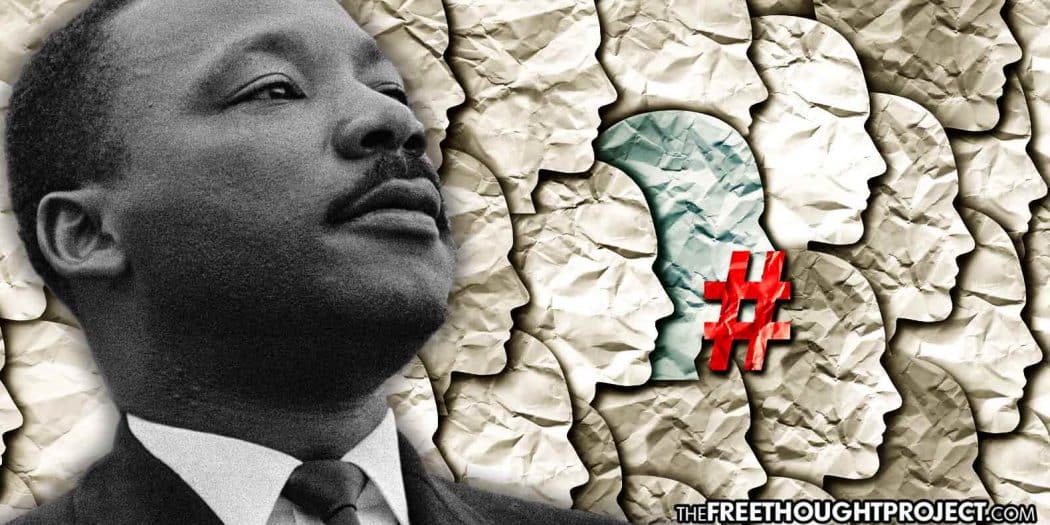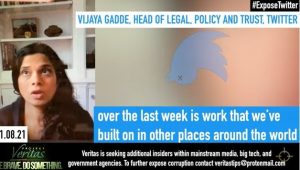By Matt Agorist
Earlier this month, Donald Trump and 70,000,000 of his supporters were wiped off of Facebook and Twitter in a coordinated move by big tech censors. This move was largely praised by the left as the vitriol spewed by many of these folks, including the president, was inflammatory, offensive, and some of it even violent. While calls for unprovoked violence should never be tolerated, the idea of silencing people for their peaceful political views — even if they are really stupid — is never a good idea.
In fact, multiple anti-Trump folks were swept up in the censorship dragnet as well, including entirely peaceful folks.
Showing the slippery slope of widespread blanket censorship policies is the fact that just days after Trump and his Q base were deplatformed, a man who has devoted his entire life to peace and liberty, Dr. Ron Paul, was also censored. After news of his censorship began to make headlines, Facebook backtracked and claimed it was “a mistake.” But was it really?
In an email to the Free Thought Project, Dr. Paul said he wasn’t “exactly buying their explanation,” adding “It seems like Facebook is testing to see just how far they can go with banning anyone who doesn’t toe the establishment line.”
Indeed, this is a test that we’ve seen play out time and again — a test, in which TFTP has found itself too many times.
If big tech can censor one of the most antiwar and peaceful political figures of our time, imagine what they would have done with this technology during the civil rights movement. As it is Martin Luther King Jr. Day, we find it a prudent choice to examine this very question.
When most people think of the great man, born Michael King on January 15, 1929, they see an advocate for peace, who is celebrated by the US government — honored every year in January, on the third Monday.
However, what the government tells us and what this great man did are two separate stories and had Dr. King been alive today, he would have been an enemy to the establishment who would have made every move they could to silence him.
Dr. King’s position as the leader of the Civil Rights Movement began after his election as spokesman for the Montgomery Improvement Association in December of 1955. What also started in that December of 1955 was the FBI’s investigation into him.
Like all those who stand against government-sanctioned violence, Dr. King was an enemy of the state. The fact that he’s celebrated today by the same state that persecuted him is quite Orwellian.
Become an Activist Post Patron for just $1 per month at Patreon.
According to a report out of Stanford University titled, Martin Luther King, Jr. and the Global Freedom Struggle, the FBI had it out for Dr. King as soon as he began making waves.
The U.S. Federal Bureau of Investigation (FBI) began monitoring Martin Luther King, Jr., in December 1955, during his involvement with the Montgomery bus boycott, and engaged in covert operations against him throughout the 1960s. FBI director J. Edgar Hoover was personally hostile toward King, believing that the civil rights leader was influenced by Communists. This animosity increased after April 1964, when King called the FBI ‘‘completely ineffectual in resolving the continued mayhem and brutality inflicted upon the Negro in the deep South’’ (King, 23 April 1964). Under the FBI’s domestic counterintelligence program (COINTELPRO) King was subjected to various kinds of FBI surveillance that produced alleged evidence of extramarital affairs, though no evidence of Communist influence.
With a state that owes its very existence to the monopoly it holds on the use of violence, anyone who is pro-peace is a potential threat. This was the case in the 20th century just as it is the case in the 21st century. The fact that Americans take off of work one day in January, does not negate the reality that this struggle continues.
In fact, the government is still very engaged in fighting the antiwar and pro-peace narrative King so eloquently espoused. And they have no qualms talking about this in the open.
After deleting the pages of hundreds of antiwar and pro-peace media and activist outlets in October 2018, Facebook then followed up with another giant move to silence. This time, they had no problem noting that they went after pages whose specific missions were “anti-corruption” or “protest” movements.
“Some of the Pages frequently posted about topics like anti-NATO sentiment, protest movements, and anti-corruption,” Facebook’s head of cybersecurity policy, Nathaniel Gleicher wrote in the blog post. “We are constantly working to detect and stop this type of activity because we don’t want our services to be used to manipulate people.”
Since then, this crackdown on “anti-corruption” chatter has increased ten-fold. Just last week, yours truly was banned from Facebook for saying censorship is not okay and pointing out what it always leads to — tyranny and suffering.
Make no mistake, because Dr. King broke through the divisive paradigm and bridged the gap between different cultures so well, he would undoubtedly been a target of these tech giant censors who aim to keep you divided. The Atlantic Council would have likely had a special committee devoted to solely silencing his “dangerous” talks of peace.
Like Dr. King, however, many activists of today are unafraid of speaking truth to power, even when faced with police action and censorship.
Like the activists of today, Dr. King’s activism was often met with brutal backlash from police. Just like the protesters of today, who peacefully march in solidarity to end police violence and war, the protesters of the ’50s and ’60s were met with violence from the police.
Attacks against non-violent protesters are nothing new. In the ’60s, as the marches increased, so did the attacks against non-violent demonstrators.
“There may be some tear gas ahead. But I say to you today, that I’d rather die on the highways of Alabama, than make a butchery of my conscience,” said Dr. King in his famous speech just prior to the Selma-Montgomery march in which protesters were met with such violence from police that the day would be forever remembered as “Bloody Sunday.”
The first march took place on March 7, 1965, and it gained the nickname “Bloody Sunday” after its 600 marchers were attacked at the Edmund Pettus Bridge after leaving Selma; state troopers and county posse attacked the unarmed marchers with billy clubs and tear gas.
Just like the thousands of police brutality protesters over the summer were met with rubber bullets, tear gas, and arrests — Dr. King was no stranger to police and being arrested, in fact, during his 12-year run as the leader of the civil rights movement, he was arrested 30 times.
Today, there is a good chance Dr. King would be referred to as a ‘thug’ by a large portion of society — and police — for his activism.
Dr. King, like many of the protesters of today, stood against state violence and war. Those who wage the wars and initiate the violence, delegating a single day in January to honor a man who stood against their very tactics, is defamatory to this struggle for peace, to say the least.
So, while you are out there today, enjoying the day off, remember that this struggle is far from over. There are countless individuals continuing to try to live in the way Dr. King advocated and who face constant bombardment from the establishment for doing so.
As long as innocence is lost to those who claim to protect it, the conflict remains. As long as people of all races are harassed, kidnapped, locked in cages or killed over victimless crimes, our strife will persist.
Not until the corruptions ceases, not until all the troops are brought home, not until a person can do with their own body as they see fit, not until the brute force changes to compassion, will the perpetual struggle of Dr. King and all those before and after him, be complete.
“Peace is not merely a distant goal that we seek, but a means by which we arrive at that goal.” – Martin Luther King, Jr.
Also Read from Activist Post:
The Big Tech Exodus Has Begun — Join Us! (Updated)
Blockchain Social Networks: Alternatives to Facebook, Twitter, YouTube and Medium
Source: The Free Thought Project
Matt Agorist is an honorably discharged veteran of the USMC and former intelligence operator directly tasked by the NSA. This prior experience gives him unique insight into the world of government corruption and the American police state. Agorist has been an independent journalist for over a decade and has been featured on mainstream networks around the world. Agorist is also the Editor at Large at the Free Thought Project. Follow @MattAgorist on Twitter, Steemit, and now on Minds.
Subscribe to Activist Post for truth, peace, and freedom news. Send resources to the front lines of peace and freedom HERE! Follow us on Telegram, SoMee, HIVE, Flote, Minds, MeWe, Twitter, Gab and Ruqqus.
Provide, Protect and Profit from what’s coming! Get a free issue of Counter Markets today.






